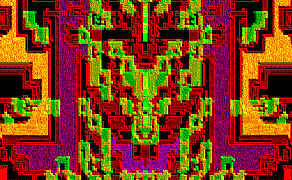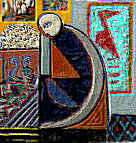2003 Rev. Canaan Sodindo Banana, born
on 05 March 1936, a Methodist minister who gave new meaning to the expression
“Banana Republic” as the largely ceremonial President of Zimbabwe
from its 18 April 1980 independence to 31 December 1987 when the prime minister
since independence, Robert Gabriel Mugabe [21 Feb 1924~] took over the presidency
too and became a dictator. In May 2000, the Zimbabwe Supreme Court upheld
Banana's conviction for sodomy and jailed him for a year. — Banana
earned a diploma in theology at a college in Epworth and was ordained in
1962. He became involved in politics and rose to be vice-president of the
African National Council. When many Council members were arrested in the
late 1960s, Banana and his family fled to the United States and did not
return until 1975. Banana was arrested upon his return and remained in prison
until 1979, after the Lancaster House agreement. Banana played a big role
in bringing the two major groups of freedom fighters ZANU and ZAPU together
to form Zanu(PF). This was essential in order for the agreement to be signed.
Under the new constitution Banana became the first president, a largely
ceremonial role. In 1987 his post was taken over by Mugabe, who made himself
executive president. Banana became a diplomat for the Organisation of African
Unity and head of the religious department at the University of Zimbabwe.
In 1996 he was arrested in Zimbabwe on charges of sodomy, following accusations
made during the murder trial of his former bodyguard, Jefta Dube. Banana
was found guilty of eleven charges of sodomy, attempted sodomy and indecent
assault in 1998. He fled to South Africa while on bail before he could be
imprisoned, apparently believing Mugabe was planning his death. He returned
to Zimbabwe in December 1998, after a meeting with Nelson Mandela. Banana
was sentenced on 18 January 1999 to ten years in jail, nine years suspended
and he was also defrocked. He served two years in prison before being released
in January 2001. He died of cancer.
2003 A US military policeman,
in a patrol attacked with a rocket-propelled grenade in Iskandariyah, 60
km south of Baghdad, Iraq.
 2002
Tirza Damari, 42, Dori Yitzhak, 44, Revital Ohayoun, 34, and her sons Noam,
4, and Matan, 5, [photo: Noam, left, and Matan, right >]
shot in the evening by Palestinian intruder Sirhan Sirhan, a Fatah activist
(distant cousin of Robert Kennedy's murderer), in Kibbutz Metzer, Israel,
close to the West Bank border. Damari, a visitor from Elichin, was walking
near the dining hall when the intruder shot her. Yitzhak, the kibbutz secretary
was on guard duty, and he was shot when he rushed to the scene. The gunman
then entered the Ohayouns' home, where Revital was on the phone with her
ex-husband Avi Ohayoun, and shot them, the children in their beds, then
escaped. The kibbutz, founded by the leftist Hashomer Hatzair movement,
was known for its advocacy of reconciliation with the Palestinians and support
a peace including an Israeli withdrawal from the West Bank. 2002
Tirza Damari, 42, Dori Yitzhak, 44, Revital Ohayoun, 34, and her sons Noam,
4, and Matan, 5, [photo: Noam, left, and Matan, right >]
shot in the evening by Palestinian intruder Sirhan Sirhan, a Fatah activist
(distant cousin of Robert Kennedy's murderer), in Kibbutz Metzer, Israel,
close to the West Bank border. Damari, a visitor from Elichin, was walking
near the dining hall when the intruder shot her. Yitzhak, the kibbutz secretary
was on guard duty, and he was shot when he rushed to the scene. The gunman
then entered the Ohayouns' home, where Revital was on the phone with her
ex-husband Avi Ohayoun, and shot them, the children in their beds, then
escaped. The kibbutz, founded by the leftist Hashomer Hatzair movement,
was known for its advocacy of reconciliation with the Palestinians and support
a peace including an Israeli withdrawal from the West Bank.
2002
Vinalene Leopper, 93, her grandson Bryan Leopper, 45; Margie Williams, 73,
her son Joey Michael Williams, 47; Russell Hines, 55, and his 3-month-old
granddaughter Madison Goode; Connie Asbury, 36; Charles "Chick" Templeton,
81; and 28 others by tornadoes, that evening and past midnight
into the next day, as 88 tornadoes cause devastation from Arkansas to Pennsylvania.
The Leoppers lived in Joyner, Tennessee, where Brian's parents, Henry and
Faye Leopper, are badly injured. The Williams lived in separate homes in
Mossy Grove, Tennessee (60 km west of Knoxville); Mike Williams was a transportation
officer at Brushy Mountain State Prison in Petros. Hines was driving his
Blazer vehicle on Matt Edmond Road in Mossy Grove, to seek shelter. Asbury
was from the same area. Templeton lived in Clark, Pennsylvania. — Also
in Mossy Grove, Quentin Woody, 11, is taking a shower in his mobile home,
in the evening. A tornado strikes, pulverizes the home, scattering as far
as 1 km away its debris and contents, including Quentin, who lands 300 m
away, unconscious but almost unhurt (he did need a few stitches). Other
members of his family are not so lucky: his mother has a broken back, his
father badly injured shoulders, his sister Sarah, 13, a broken arm. The
tornado is one of 88 which, that same night, kill 36 persons from Arkansas
to Pennsylvania, and inflict enormous damages
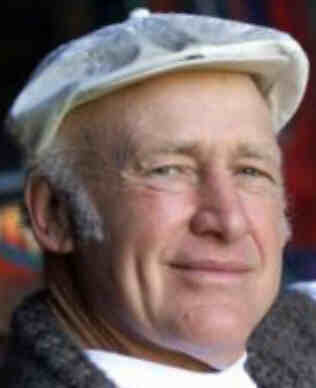 ^
2001 Ken Kesey, 66, author. ^
2001 Ken Kesey, 66, author.
He dies two weeks after cancer surgery to remove 40% of his liver,
author. Kesey was diagnosed with diabetes in 1992. Born in La Junta,
Colo., on 17 September 1935, Kesey moved in 1943 from the dry prairie
to his grandparents' dairy farm in Oregon's lush Willamette Valley.
He earned a bachelor's degree in journalism from the University of
Oregon, where he also was a wrestler. After serving four months in
jail for a marijuana bust in California, he set down roots in Pleasant
Hill in 1965 with his high school sweetheart, Faye, and reared four
children. He wrote novel "One Flew Over the Cuckoo's Nest" (1962),
"Sometimes a Great Notion" (1964),
"Sometimes a Great Notion," considered Kesey's greatest book, told
the saga of the Stamper clan, rugged independent loggers carving a
living out of the Oregon woods under the motto, "Never Give A Inch."
It was made into a movie.
"One
Flew Over the Cuckoo's Nest" tells the story of R.P. McMurphy, who
feigned insanity to get off a prison farm, only to be lobotomized
when he threatened the authority of the mental hospital, from the
viewpoint away of the schizophrenic Indian, Chief Bromden. Kesey based
the story on experiences working at the Veterans Administration hospital
in Palo Alto, while attending Wallace Stegner's writing seminar at
Stanford. Kesey also volunteered for experiments with LSD. While Kesey
continued to write a variety of short autobiographical fiction, magazine
articles and children's books, he didn't produce another major novel
until "Sailor Song" in 1992, his long-awaited Alaska book, which he
described as a story of "love at the end of the world."
A graduate of the University of Oregon, Kesey returned there in 1990
to teach novel writing. With each student assigned a character, the
class produced "Caverns," under the pen name OU Levon, or UO Novel
spelled backward.
One of his
children's books was "Little Tricker the Squirrel Meets Big Double
the Bear," which he wrote from an Ozark mountains tale told by his
grandmother.
Other works include
"Kesey's Garage Sale" and "Demon Box," collections of essays and short
stories, and "Further Inquiry," another look at a psychedelic 1964
bus trip in which the soul of Cassidy is put on trial. "The Sea Lion"
was another children's book, telling the story of a crippled boy who
saves his Northwest Indian tribe from an evil spirit by invoking the
gift-giving ceremony of potlatch. |
|
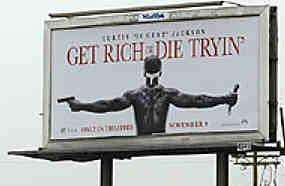 2005
Sheldon Flowers, 30, dies a few hours after tryin', not to get
rich but to win an argument with three other persons, with one of whom,
at 23:06 on 09 November (04:06 UT on 10 Nov), he exchanged gunshots, three
of which hit him, in the lobby of the Loews Cineplex at West Homestead,
near Pittsburgh PA. In one of its 22 theaters Flowers had just seen Get
Rich or Die Tryin', a movie starring ex-convict and drug dealer rap
star Curtis
Jackson “50 Cent” [06 Jul 1975~] as Marcus, a drug dealer
aspiring to be a rapper. The movie has been attacked as promoting violence,
most visibly by billboards showing from the back the shirtless star holding
out a microphone in one hand and a gun in the other. —(051112)
2005
Sheldon Flowers, 30, dies a few hours after tryin', not to get
rich but to win an argument with three other persons, with one of whom,
at 23:06 on 09 November (04:06 UT on 10 Nov), he exchanged gunshots, three
of which hit him, in the lobby of the Loews Cineplex at West Homestead,
near Pittsburgh PA. In one of its 22 theaters Flowers had just seen Get
Rich or Die Tryin', a movie starring ex-convict and drug dealer rap
star Curtis
Jackson “50 Cent” [06 Jul 1975~] as Marcus, a drug dealer
aspiring to be a rapper. The movie has been attacked as promoting violence,
most visibly by billboards showing from the back the shirtless star holding
out a microphone in one hand and a gun in the other. —(051112) 2002
Tirza Damari, 42, Dori Yitzhak, 44, Revital Ohayoun, 34, and her sons Noam,
4, and Matan, 5, [photo: Noam, left, and Matan, right >]
shot in the evening by Palestinian intruder Sirhan Sirhan, a Fatah activist
(distant cousin of Robert Kennedy's murderer), in Kibbutz Metzer, Israel,
close to the West Bank border. Damari, a visitor from Elichin, was walking
near the dining hall when the intruder shot her. Yitzhak, the kibbutz secretary
was on guard duty, and he was shot when he rushed to the scene. The gunman
then entered the Ohayouns' home, where Revital was on the phone with her
ex-husband Avi Ohayoun, and shot them, the children in their beds, then
escaped. The kibbutz, founded by the leftist Hashomer Hatzair movement,
was known for its advocacy of reconciliation with the Palestinians and support
a peace including an Israeli withdrawal from the West Bank.
2002
Tirza Damari, 42, Dori Yitzhak, 44, Revital Ohayoun, 34, and her sons Noam,
4, and Matan, 5, [photo: Noam, left, and Matan, right >]
shot in the evening by Palestinian intruder Sirhan Sirhan, a Fatah activist
(distant cousin of Robert Kennedy's murderer), in Kibbutz Metzer, Israel,
close to the West Bank border. Damari, a visitor from Elichin, was walking
near the dining hall when the intruder shot her. Yitzhak, the kibbutz secretary
was on guard duty, and he was shot when he rushed to the scene. The gunman
then entered the Ohayouns' home, where Revital was on the phone with her
ex-husband Avi Ohayoun, and shot them, the children in their beds, then
escaped. The kibbutz, founded by the leftist Hashomer Hatzair movement,
was known for its advocacy of reconciliation with the Palestinians and support
a peace including an Israeli withdrawal from the West Bank.
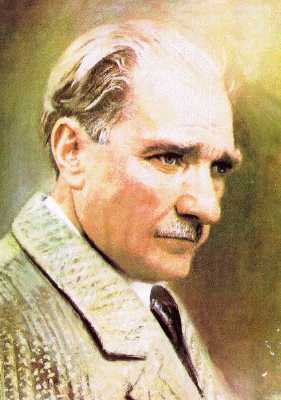

 1919
Moise-Kapenda Tshombe, President of seceded Katanga,
then premier of the Congo, who died in exile on 29 June 1969.
1919
Moise-Kapenda Tshombe, President of seceded Katanga,
then premier of the Congo, who died in exile on 29 June 1969.